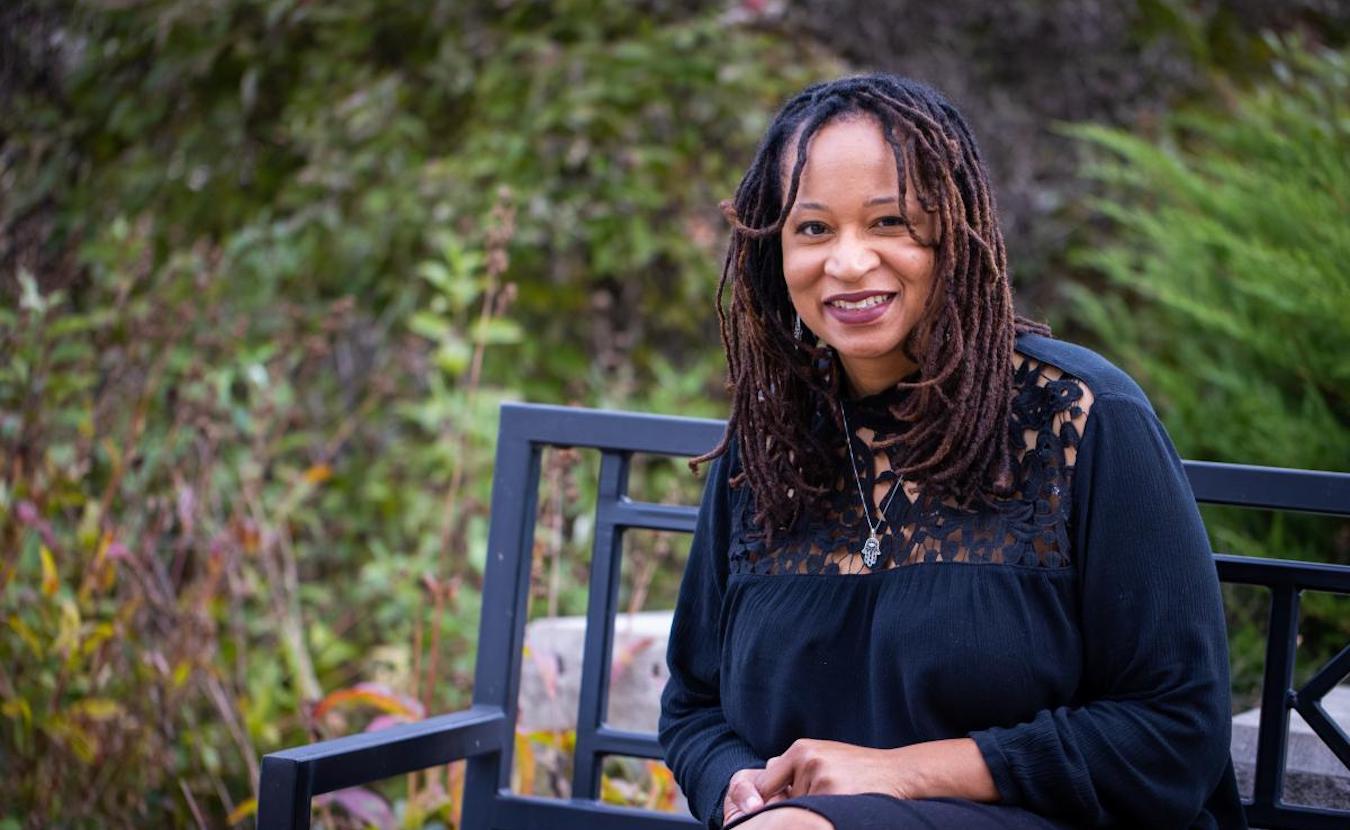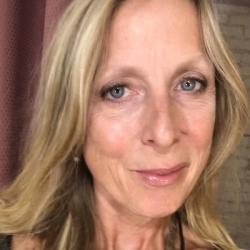Editor’s Note: Published May 3, Jacinda Townsend’s new novel, Mother Country (Graywolf Press, 2022), tackles the subject of motherhood from two perspectives on different sides of the world. Now the Helen Zell Visiting Professor in Fiction at the University of Michigan, Townsend was associate professor of English at Indiana University when her 2014 debut novel, St. Monkey (Norton), was published. Awarded the Janet Heidinger Kafka Prize and the James Fenimore Cooper Prize for historical fiction, St. Monkey was also the 2015 Honor Book of the Black Caucus of the American Library Association.
Already receiving glowing reviews, Mother Country alternates between the story of Shannon — a Black woman in Louisville who’s got her share of western world struggles — and Souria — a Mauritanian woman who’s got her share of non-western struggles — and refuses to take sides. In anticipation of their conversation on Monday, June 6 at 6:30 p.m. at Bloomington’s Morgenstern Books, Limestone Post is sharing excerpts of Yaël Ksander’s interview with Townsend (edited slightly for clarity), which aired on WFIU’s Inner States in May and can be heard on the Inner States podcast.
Yaël Ksander: Before we get into the books, I’d really love for our listeners to get acquainted with you. So maybe you can give us a sort of a thumbnail picture of your journey.
Jacinda Townsend: I kind of traveled the route of Odysseus to get to this book. And I’m so fortunate because it was only through a series of coincidences that I ever got to Morocco in the first place.
I grew up in south-central Kentucky and left when I was 16. And spent the rest of my life trying to get back, actually. I got very close. I got to Bloomington, Indiana, and spent almost 10 years there. And you know, those were my favorite years. We actually came back — we Bloomeranged back after moving to California and had some more favorite years in Bloomington.
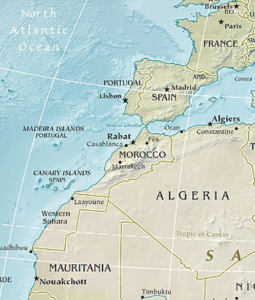
Travels to Morocco and Mauritania have inspired Townsend’s writings. | Map by physicalmap.org, CC BY-SA 4.0, via Wikimedia Commons. The map has been cropped.
I had been a lawyer and a broadcast journalist in New York City. From there, I went to the Iowa Writers Workshop. After that everything turned magical. The first thing that happened to me was right after I got my MFA, I got a Fulbright to Côte d’Ivoire. And I had never lived in Africa, and I wanted to see as much of Africa as I could. So technically as a Fulbrighter, you’re supposed to stay in that country. But I would leave for the maximum amount of time I could leave. So on one of those trips back to New York to see my then-husband, the layover from Abidjan to New York City was in Casablanca. So I decided to get another stamp on the passport and extend that layover for four days. And during those four days, I took the Marrakech Express down from Casa to Marrakech and it just blew my mind that there were so many different Moroccos, even between Casablanca and Marrakech. It was like there were two different planets.
And so I began to go back. And one of the first times I went back, I took my two-year-old daughter, and we had an amazing time, and then I had another kid. And every summer, we would go to a different city in Morocco and have a whole different experience. I often tell people that in a lot of ways the kids would grow up there in the summer, but I would too, you know, very much. Morocco is kind of like an abusive spouse for me because it’s the kind of place where particularly if you’re a woman traveling alone or traveling alone with children, you get the best and the worst sides of Moroccan hospitality. There’s quite a patriarchy there. People are very suspicious of women traveling alone. But also a lot of people are really hospitable. And when the kids were little, when they were babies, people would just grab them from me and kiss them. And they would haul our water for us.
One of the side trips, though, I went without my kids to Mauritania. I knew I couldn’t take them there because it [would be] a really hard trip. There was one ATM in the country. It wasn’t working. I had to be chaperoned to the bank, because I was a woman. The streets there are made of sand — there are no paved roads. I was hosted by a couple of anti-slavery activists, and one of them introduced me to a family of slaves. And I spoke to one [woman in the family] through a translator: I was speaking French to her and she was speaking Hassaniya back to me. She had a harrowing story [but] it’s not unusual. Slavery in Mauritania is brutally enforced. It’s a kind of a brutal caste-based system. And she had escaped slavery with her eight children. All eight of them were completely different colors, because her master had leased her out. And I said, you know, what can I do for you? You know, she was living in this tent on the edge of the capital city. And she said, “Just tell my story, please just tell my story.” So I thought to do that with this novel. And so from there, you know, the rest is kind of writing history.
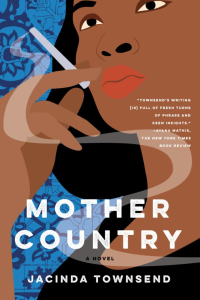 YK: Wow, this fills in so many gaps! There are so many touchpoints between your experience and the novel. [Your protagonist] Souria has been in slavery and she escapes. And it is at a bank, actually, or a sort of an accountant [where she does so]. And, of course, even your speaking about your two-year-old being picked up — we see a reprise of that action as the pivotal action in your novel. And then also all of these dialects intersecting — French, Hassaniya, Darija. So you had an actual calling from this woman you met to tell her story?
YK: Wow, this fills in so many gaps! There are so many touchpoints between your experience and the novel. [Your protagonist] Souria has been in slavery and she escapes. And it is at a bank, actually, or a sort of an accountant [where she does so]. And, of course, even your speaking about your two-year-old being picked up — we see a reprise of that action as the pivotal action in your novel. And then also all of these dialects intersecting — French, Hassaniya, Darija. So you had an actual calling from this woman you met to tell her story?
JT: Yes. The [Mauritanian] government understandably does not want people to report about slavery there. They kind of want to pretend that it’s not happening. They didn’t outlaw it, actually, until 2008. And you can count on probably two hands the number of cases that have been successfully prosecuted against slave masters. So I felt compelled to tell it for that reason, as well, because [another] thing that blew my mind is that there’s only one television station there and it is state run, and there’s not much radio there, either. And so you have a population of people who sort of believe what they are being told about slavery, and even the slaves themselves often believe that this is the will of Allah, that they are enslaved, you know. One of the people who I interviewed said to me, “Well, you know, there’s all kinds of slavery and even in your country, maybe some of the things you do are slavery,” and I thought, it is true that truth is subjective, but I think it is objectively true that brutal slavery is kind of wrong, you know, and so I did feel really compelled by that sort of pushback to tell this story of just how wrong it really is.
YK: As exotic as [Souria’s story might be for Western readers] and as exotic as the locale is, nonetheless, there are serious throughlines with Shannon’s story, which you tell in an alternating narrative throughout the novel. And then there are also thematic throughlines to your other novel. And so I would say, to any reader who might be slightly hesitant because of the introduction of dialects of Arabic or unusual locales, that really we’re talking about some themes that are unfortunately very universal, such as the intergenerational Black experience of trauma, moral relativity, and the limits but also the possibilities of personal choice in a world whose forces tend to crush it.
JT: Yes.
YK: And so I guess I would bring it back to the fact that you made this choice to tell this story. It feels at once like a real departure but at the same time coming back to what you know.
JT: Yes. And, you know, I hadn’t really realized it until I finished the first draft of this one that I had told yet another story in a diptych with two different voices. But it was kind of similar in the sense that, in a way, you know, even in 2022 — my other novel’s set in 1955 — women are constrained, but only in different ways. So Shannon, the other character in the novel, is facing a lot of existential angst, but she’s also facing some really tangible constraints in that she’s burdened with student loans, she’s struggling with infertility, she has to get married, because she doesn’t have dental insurance. And in a lot of ways, these are all constraints that are informed by gender to some extent. And so she’s not facing this harrowing life of slavery and its aftermath, she is dealing with her own troubles.
“I feel artists can’t avert their eyes from a situation. It’s something I’m entirely committed to.” —Jacinda Townsend
It’s funny, during the editorial process, people wanted to sort of take sides. And generally people want to side with Souria because Shannon — and I don’t think it’s too much of a spoiler to say because it happens in the first chapter — takes Souria’s child. But I think she’s Lando Calrissian, you know, from Star Wars? She’s got problems of her own —
YK: And that’s where the moral relativism comes in?
JT: Yes, yes. And, you know, her story came from a much more intensely personal place. Because before I ever had kids, I adopted this whole cosmology about what birth would be like, and I thought, oh, I will give birth in a pool of water and Bambi will come out of the forest and whisper in my ear. That is not at all how it happened. They were both C-sections. And it took me years not to feel like a failure about that. I think it wasn’t until I had my second kid that I was like, okay, you can just let all that go, because you’re really their mother now. But I spooled that out kind of to the nth degree in my head, and thought, well, what if you came by a child in some really crazy way? How long would it take you to feel like a proper mother? And so it was healing for me to write this really. I think parenting is in every act that comes after that moment of birth. What I want to call “the birth industry” does such a disservice to women. Because you’re told, you know, in all the months leading up to this birth, that that’s gonna be like this huge moment of impact, like it’s a meteor has struck the earth. But parenting is everything you do after that. So [Shannon’s] story, in a way, is the more personal one to me — her becoming a mother and owning it — was really important for me to tell as well.
YK: You talk a lot about the kind of credentialing nature of motherhood and how Shannon feels as though once she punches that card, she will be an official adult. And just that particular role that mothering plays for the mother. And it’s quite ubiquitous in American culture, but at the same time, what short shrift it gives to what a child needs. Really that credentialing is more about filling the mother’s needs.
JT: Yes, yeah. There’s a quote at the beginning of the book. A little epigraph from David Gibb, who is the father of Kilauren Gibb, Joni Mitchell’s biological child, who was put up for adoption in 1965. She didn’t meet Joni Mitchell until she was 32. And he says, “People are born. They are a life. They belong to nobody.” And without offering too much of a spoiler, in terms of what you were just saying, I wanted not to ignore the story of the adoptee themselves. Because you know, a big question of the book is actually the child’s question: Who is my mother; what makes my mother? And I gave [the child] the last line of the book for that reason, as well.
“She was living in this tent on the edge of the capital city. And she said, ‘Just tell my story, please just tell my story.’”
YK: A real commonality among all of your female characters — the ones who are mothers, the ones who have mothers — is that the mothers are relentlessly cruel. And there is an unremitting, inexorable unkindness that is visited from one generation to the other.
JT: I feel like mothers are, we are unjustly exalted. And that exaltation in a lot of ways harms us, because what we have is this cult of perfect motherhood, you know? One of my favorite movies has become The Lost Daughter, that [Elena] Ferrante [adaptation]. I love that because it’s so real. I think this every Mother’s Day. Mother’s Day just makes me so angry, actually. I think people have strong feelings about it — including mothers ourselves, you know — and nobody’s allowed to say it on Mother’s Day. You’re supposed to take your chocolate and be really happy even though everybody’s kind of messed up the kitchen and you’re gonna have to clean that up, you know? Here’s my one day to relax. But no, that’s not even possible, right?
We deem mothers as potential saints. At the same time, we make it almost impossible in the United States for mothers to be at peace, even if they were saints. I get really exercised thinking about it. And even in terms of characters in literature, women in general, we don’t allow them to be unlikable characters. We sort of decide that if they’re not likable, they’re not investable, whereas you rarely hear a critic saying of the male character, “You know, I just, I didn’t like him, so I didn’t want to read this anymore.” But we expect that of female characters just as we in some ways expect it from real women. So I love to poke holes in this trope of the perfect mother because we are not but we’re just as lovable for our imperfections.
YK: I love it. And you’ve really homed in on the mother, the imperfect mother and the woman’s story in this book. Your morally ambiguous female characters to me are your most interesting characters. So Shannon, the Louisville native who is one of the two women who are your protagonists in Mother Country, is, yeah, I’d call her morally ambiguous. She — and it’s not a spoiler because it happens on page 15 — steals a child, like straight up steals a child. Like, how is it okay?
JT: Steals is a strong word!
YK: Okay, okay. Well, let’s say she “borrows a child.”
JT: [Laughs]
YK: So she borrows a child. She assumes that the child is homeless or doesn’t have a family and then she uses her cultural seniority to manufacture some documents to abscond with said child. Um, this is …
JT: Steals. [Laughs]
YK: Okay. So anyway, in our current culture, you could just say, “Oh, this is hideous, this is heinous” [and dismiss Shannon]. In the wake of that event, however, we also see the evolution of Shannon. And so that’s what’s the most compelling aspect of that book, if you ask me: the way she grows.
JT: Thank you for saying that because I wanted it to be a trajectory of growth for Shannon. It was definitely a thing that happened on subsequent drafts. When I decided that I was not going to take sides, I had to really sort of develop backstory, and in some ways developed front-story as well, because even aside from those sorts of societal constraints she’s facing, there’s a lot of existential angst.
“Shannon’s story, in a way, is the more personal one to me — her becoming a mother and owning it — was really important for me to tell.”
YK: There’s an important theme that really captured me in this most recent book, and in the previous one. It has to do with language, or more broadly, code. So I see the universe of both stories as one that is dark and wants to chew you up and spit you out. And in the midst of this universe, you create characters who cope with it in different ways, some more successfully than others. The coping strategy a lot of times seems to have to do with learning a code or a language. The times that I see tenderness in this pretty harsh world of yours, whether it’s on one side of the Atlantic or the other, it’s happening because of the transmission of language — whether it’s Souria learning the dialect from Adwan, or later learning the letters from her employer, and just getting more access to the world, getting connection, feeling grounded, having more power. But I also see it on Shannon’s side: The time that she is finally kind of at peace is when she gets that job reading to the blind. Was that intentional? I mean, as a writer, obviously, language is your currency —
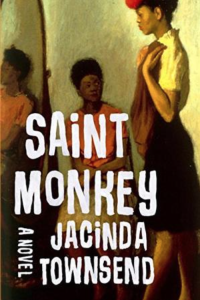
Townsend’s first novel, “St. Monkey,” was published in 2014 when she was an associate professor of English at Indiana University.
JT: Yeah. And I guess it maybe wasn’t intentional. But in researching this novel, I had so many moments and so many experiences, not being able to connect with people I wanted to be connected with because of language. You know, in some ways, it’s kind of the ultimate point of connection, or it can be the ultimate gulf. There were times in Mauritania I had access to translation, and then times I didn’t. One summer we went, I worked with a church group who were helping people in the sex trade in Morocco. In Morocco, it’s extremely hard to get a work visa. And so what happens is women who end up there invariably have to go into the sex trade. So this group was doing work for them.
And I could not talk to them. I was able to do things that were helpful to them. Like one thing we did for them — we gave them pedicures, which is a way of communicating through touch. It’s a way of literally touching people in the most intimate of ways. But to me that is not as intimate as language. It’s not as intimate as knowing a person’s mind and hearing their experiences. So if anything, it was just maybe a bit of personal knowledge that made it into the book, for how terrible it feels when you’re there to get to know a country, and you can’t really connect to people.
YK: Clearly, this novel in particular, and probably a lot of your writing, your literary work is motivated by your values. With this one, you mentioned the backstory of wanting to tell the tale of the woman who had been in slavery. I’m curious about your choices in your life, in your career. Your devotion to social justice has manifested itself in many ways: In Bloomington, you were our leader of Black Lives Matter, you also played a role on the Monroe County School Corporation school board. And of course, you are pursuing your social justice goals through your writing of literature. How do you balance that? Do you have the conviction that fiction can save the world?
JT: I do, actually. I think that artists are unique in that it’s a job requirement to step out of our skin into someone else’s skin, and then come back and transmit that person’s experience to the rest of the world. And I think that art can serve and for me, I just don’t make art that doesn’t serve. I just can’t do any more. And I think that that’s why I do see it as a calling. I think that when you go to a country like Mauritania, and you see someone in this circumstance, who can’t tell their story, I think it behooves you to tell it, and that’s what I felt. I feel that the artists can’t avert their eyes from a situation. It’s something I’m entirely committed to.
But the novel I’m working on now is actually about a woman whose father is killed in the late ’80s by a policeman, and she changes her identity and moves from California to Kentucky. And it’s about grief. That’s kind of its overarching thing. But it’s also very much about the impact that police brutality has on not just the individual themselves — the victim — but also their families and their communities. And it just ripples out. So I am really trying to write in service. Yes, thank you.
YK: Wow, fantastic. And, you know, I personally believe that people are more moved by art than they are by a screed or manifesto. That if you can create empathy, then you’re most of the way there.
JT: Yes. Well, this has been the most wonderful time, Yaël, thank you for having me on.
YK: You are so welcome, Jacinda, congratulations. I can’t wait to see the encomiums come through as they have already begun to. I am deeply honored by having had the chance to speak with you.
JT: Same here. Thank you.
 Jacinda Townsend and Yaël Ksander will have another conversation, in person, at Morgenstern Books, 849 Auto Mall Rd. in Bloomington, on Monday, June 6, at 6:30 p.m., and on Facebook. You can listen to their conversation from May on WFIU’s Inner States program. Morgenstern’s in an Underwriter of Limestone Post.
Jacinda Townsend and Yaël Ksander will have another conversation, in person, at Morgenstern Books, 849 Auto Mall Rd. in Bloomington, on Monday, June 6, at 6:30 p.m., and on Facebook. You can listen to their conversation from May on WFIU’s Inner States program. Morgenstern’s in an Underwriter of Limestone Post.

